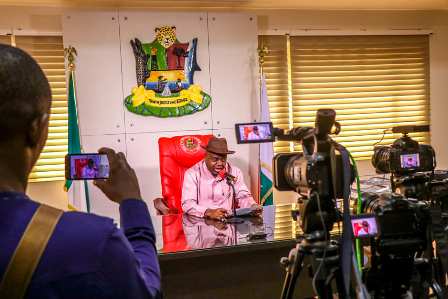Niger Delta
Bayelsa Govt Commits To End Infrastructural Deficit

Bayelsa State Government has commended President Muhammadu Buhari for his efforts to reimburse some state governments for funds used in executing various federal projects in their states.
The state Governor, Senator Douye Diri gave the commendation in Yenagoa when he received members of the National Assembly Joint Committee on Local and Foreign Debts in Government House, Yenagoa.
Governor Diri who was represented by his deputy, Senator Lawrence Ewhrudjakpo, noted that the gesture would enable state governments to redouble their collaborative efforts in addressing the infrastructural deficit in the country.
A statement by the Senior Special Assistant on Media to the Deputy Governor, Mr Doubara Atasi, maintained that most state governments were discouraged from deploying their scarce resources to fix dilapidated federal projects located in their areas due to Federal Government’s reluctance towards repayment.
Speaking to newsmen shortly after conducting members of the National Assembly round some federal projects including the Ekoli Bridge along the Yenagoa-Oporoma Road, Senator Ewhrudjakpo expressed optimism that the inspection visit would facilitate the release of funds owed the state.
While thanking the Joint Committee for the visit, he urged the executive and judicial arms of government to accord the legislature its pride of place in the scheme of democratic governance.
According to the Deputy Governor, democracy cannot survive without the legislative arm performing its core functions of law-making, oversight and representation in society.
“The National Assembly is a very important institution which has not been given due attention and respect in this country because they see us as new entrants into the Nigerian hemisphere of governance”, he said.
“But they should not forget that if there is no law-making, no oversight and no representation, then there will be no democracy. It is on these three pillars that democracy actually stands”, he added.
“I believe that the National Assembly is the highest institution that must be respected by all. Having been part of that institution, the Governor and I will continue to give it respect”, the Governor noted.
The statement from the Deputy Governor’s media aide has it that the delegation was made up of members of the Senate and House of Representatives Committees on Foreign and Local Debts which came to the state to ascertain the veracity of claims by the state Government on the execution of federal projects in the state.
“We thank the Federal Government and the National Assembly for this effort, which we believe will facilitate the release of the funds due our state, which can be used in developing other critical sectors”, the Governor restated.
Also speaking, the Chairman, Senate Committee on Local and Foreign Debts, Senator Clifford Odia and his House of Representatives counterpart, Hon. Safana Dayyabu, said the visit was to confirm the execution of federal projects with a view to facilitating the release of funds due the state on account of such projects.
By: Ariwera Ibibo-Howells, Yenagoa
Niger Delta
NPC Unveils Digital Registration System In Delta

Niger Delta
Police Uncover Suspects’ Armoury … Recover Weapons In Delta

Niger Delta
Police Caution On Lawless Protests On Court Matters In A’Ibom

-
Maritime2 days ago
Nigeria To Pilot Regional Fishing Vessels Register In Gulf Of Guinea —Oyetola
-
Maritime2 days ago
Customs Declares War Against Narcotics Baron At Idiroko Border
-

 Sports2 days ago
Sports2 days agoGombe-Gara Rejects Chelle $130,000 monthly salary
-
Maritime2 days ago
NIMASA,NAF Boost Unmanned Aerial Surveillance For Maritime Security
-
Maritime2 days ago
NIWA Collaborates ICPC TO Strengthen Integrity, Revenue
-

 Sports2 days ago
Sports2 days agoTEAM RIVERS SET TO WIN 4×400 ” MORROW” …Wins Triple jump Silver
-

 Sports2 days ago
Sports2 days agoNPFL Drops To 91st In Global League Rankings
-

 Sports2 days ago
Sports2 days agoNSC eyes international hosting rights

